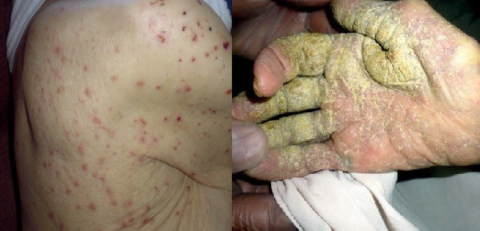The original "seven-year itch" – coming to an infestation near you!

Dr Michael Head is a Senior Research Fellow, based in the Clinical Informatics Research Unit at the University of Southampton.
He has research interests in analyses of the financing of research, evidence-informed policymaking, pneumonia and this probably-unhealthy obsession with scabies (for which he has Professor Jackie Cassell, Brighton & Sussex Medical School to thank).
It’s currently burrowed under the skin of about 200 million people around the world right now, and is spreading abuse, stigma and shame wherever it goes. Your friendly local doctor often cannot recognise it, which is perhaps fair enough given it’s less than 0.5mm long.
It’s brewing up a cocktail of ongoing misery including a fair few wounds as a result of people frantically scratching themselves, fair amount of renal disease, and the occasional bout of sepsis.
Public health burden
So, let’s have a chat about the massive public health burden of scabies then. What’s that? You’d rather not? Afraid that’s all I’ve got. No, I don’t mind, do carry on eating your lunch. Oh, yes there are pictures actually. Right here, in fact.
Scabies is (if you hadn’t guessed by now) an intensely itchy skin condition, transmitted by mites. It causes rashes, and can lead to significant secondary complications including bacterial infections and renal complications. A disease of poverty, it is highly stigmatised as being “dirty” and attracts significant social stigma – the Ethiopian word for scabies “ekek” is used as a term of abuse.
The WHO estimates that 200 million people are infected globally at any point in time (anecdotally, recent conversations with the WHO suggest that may be a significant underestimate), with up to 71% prevalence in crowded or institutional settings.
Greater burden than leprosy, schistosomiasis, or dengue
Annually 0.2% of global disability-adjusted life years (DALYs) are attributed to scabies, a greater burden than leprosy, schistosomiasis, or dengue. In Ethiopia, there is an ongoing outbreak with over 400 000 scabies cases.
There, 1.2 million doses of ivermectin (anti-parasitic drug) have been administered, there is a median prevalence of 33%, duration of symptoms is five months (that’s over 20 weeks of itching), and over half of cases were in children who typically did not go to school during this time.
There is a global lack of high-quality prevalence data and significant amounts of misdiagnosis and under-reporting. In 2017, the WHO deplored the global paucity of evidence, designated scabies as a category-A NTD, and recommended prevalence studies.
For our contributions – colleagues at Brighton & Sussex Medical School are leading on scabies research studies in Ethiopia and Papua New Guinea.
Pilot study on scabies diagnosis in Ghana
I have a pilot study starting in 2019 covering improved diagnosis of scabies in Ghana. This is working with public health directors in the Volta and Greater Accra regions, and includes training from Ghanaian dermatologists (from the University of Ghana, Ghana Dermatology Society, and the Rabito Clinic).
Previously, between us, we prospectively reported on scabies outbreaks in care homes in the UK (yes, there’s plenty of it in high-income countries too). This was a complex study where we were urged to exclude patients with dementia since that would make the research ethically tricky.
We continued to include dementia patients. It certainly did make the ethics very tricky indeed, but we did discover that the most vulnerable patients in care homes are the ones who are most at risk of (among virtually every co-morbidity going) scabies infestation.
Lack of bathing not a cause of scabies
Oh and one further point – a lack of bathing is not a cause of scabies. It’s a common myth (being "unclean"), that is spread even by healthcare workers (I myself recently reviewed a paper that stated precisely that).
Overcrowding and poverty are key factors (and these populations are likely to wash less). But bathing in itself is not a factor, and the WHO have in fact written to ourselves to thank us for our response (linked above).
There are effective drugs (such as ivermectin), but little in the way of diagnostics and no vaccine and plenty of misinformation and stigma. There is little in the way of policy and guidance, due to the lack of data upon which to base any guidance. Which leads us to conclude…
Scabies, perhaps the biggest global public health problem you know very little about. Now it’s an NTD, we can hopefully start to make progress on this truly neglected disease.
Email or tweet Michael at m [dot] head [at] soton [dot] ac [dot] uk or @michaelghead
This blog is also published on the PEAH – Policies for Equitable Access to Health website
